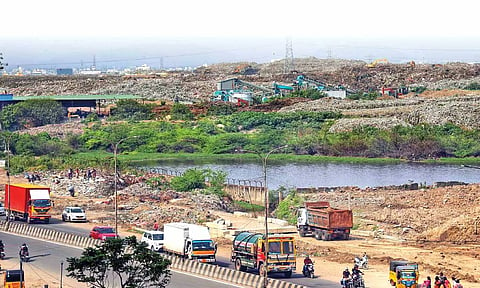

CHENNAI: After suffering for over 35 years of incessant dumping of garbage, residents around the ecologically sensitive Pallikaranai Marshland have been promised a new lease of life.
The Greater Chennai Corporation (GCC) has almost completed the bio-mining of legacy waste from Perungudi landfill to reclaim the affected portion. But informed residents, while welcoming the bio-mining move, are sceptical that projects, including an eco-park, proposed on the reclaimed land will not benefit the fragile marshland.
Regenerate groundwater
A Francis, president, Federation of Thoraipakkam Residents Welfare Associations, said that the eco-park planned by the civic body will change the nature of the marshland.
“Trees will not grow in the marshland due to its soil type. In order to grow trees in the proposed eco-park, soil from elsewhere should be brought here, and the marshland should be levelled up. This will also affect the water storage capacity of the marsh,” he explained.
Francis urged the civic body to drop the eco-park idea and other waste processing facilities proposed on the land and requested measures to allow water on the land. Moreover, legacy waste below the ground level should also be removed.
“Groundwater around the dumping yard is highly polluted forcing us to buy water from outside. In some parts, the TDS (Total Dissolved Solids) levels are more than 1,000 mg/L. If legacy waste below the ground level remains, it will continue to affect the quality of groundwater. Also, if all the legacy waste is removed completely and water allowed to stagnate, the quality of the groundwater will get better over the period,” he opined.
DPR for eco-park
When asked, a senior official of the Chennai Corporation explained that the bio-mined soil from the dumping yard will be mixed with quality soil sourced from suitable places to fill 100 acres of the marshland for the park. The park will have walkways, some trees, play areas and benches among others.
Recently, Minister KN Nehru, Municipal Administration and Water Supply Department, had announced that the eco-park will be created at Rs 50 crore in the Assembly. Now, a tentative detailed project report (DPR) has been prepared by the Corporation for Rs 100 crore.
The civic body had invited residents to participate in a public hearing meeting on the eco-park project on January 8 but it was postponed without announcing an alternate date. The official clarified that the meeting will be held after Pongal holidays as officials were busy in flood mitigation works and arrangements for the Global Investors Meet.
Nevertheless, the official assured that constructive suggestions of the public will be considered before implementing the project.
Apart from the eco-park, the civic body has plans to construct several waste treatment plants on the remaining portion of the reclaimed land. The Federation also opposed such projects too and reiterated to leave the reclaimed land as marsh.
Bio CNG (Compressed Natural Gas) with a capacity of 500 tonnes/day, windrow composting centre with 500 tonnes capacity and an automated material recovery facility 1,200 tonnes capacity are planned.
‘Leave it be’
Opposing the eco-park and other waste mining facilities is Jayshree Vencatesan, managing trustee of Care Earth Trust, who wants authorities to retain it as a coastal marshland that has part saline water and part fresh water.
“Pallikaranai marshland acts as a sponge during floods and is a refugium for biodiversity. Proposing an eco-park by filling the marshland with soil is completely erroneous. Since 2005, we’ve been saying that the landfill deters water flow. Marshland should be left as an aquatic habitat,” she opined.
Jayashree averred that any restoration project should be carried out in ‘true to type’ way and while doing such projects, wetland experts should be involved. “Moreover, Pallikaranai is a Ramsar site. Carrying out such projects in the periphery of a Ramsar site will result in losing the tag. Also, Pallikaranai marshland is only feeding habitat for birds after Point Calimere along the east coast, which is not influenced by human activities like fishing and agriculture,” she pointed out.
S Janakarajan, president of South Asia Consortium for Interdisciplinary Water Resources Studies (SaciWATERs), stated that marshland should be treated as marshland. “Other projects should be dropped. Moreover, inlet canals to the marshland should be restored. If there is no inlet canal, a canal system should be created. The best option is to let water stagnate in the reclaimed marshland,” he said. “The purpose of wetlands is to create and develop biodiversity, and they should be allowed to serve their purpose.”
Inter-departmental squabbling
As of December 2023, the city Corporation had completed the bio-mining of around 77% of legacy waste. The work is expected to be completed by June 2024.
Solid waste from Teynampet, Kodambakkam, Valasaravakkam, Perungudi, Adyar and Sholinganallur zones are being dumped in the Perungudi landfill that’s spread over 225 acres. As per an estimation in 2019, the landfill had an accumulated legacy waste of 30.62 lakh cubic metres.
The GCC has already handed over 445 acres of marshland south of Thoraipakkam-Pallavaram Radial Road to the State Forest Department while retaining the 225 acres north of the Radial Road. Additionally, the civic body had reclaimed 14 acres of Pallikaranai dumpyard with 37,509 cubic metres of legacy waste. For now, the reclaimed 14 acres is left vacant.
Meanwhile, a RTI reply given by TN Pollution Control Board (TNPCB) revealed that the civic body did not avail permission from the Board. Moreover, the Board imposed an environmental compensation of Rs 1.90 crore against Sholinganallur zone in May 2022.
On the other hand, the civic body, in another RTI reply, claimed the permission from TNPCB has not been availed as the land belongs to the civic body.
The reply also revealed that bio-mining will be carried out only up to the ground level. As of October 2023, the TNPCB has not received any application from the civic body to implement any other projects on the reclaimed land.